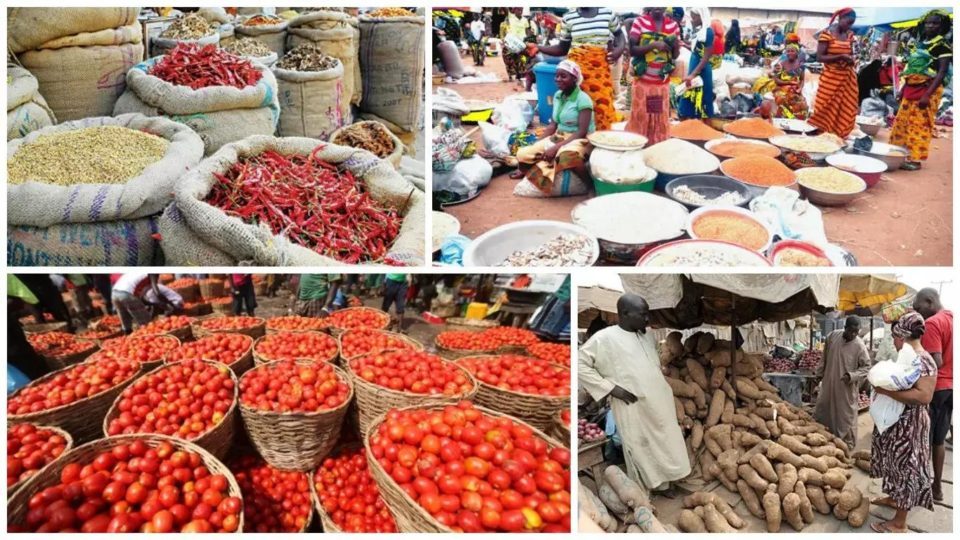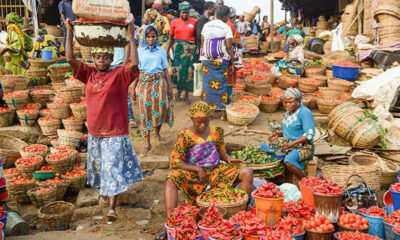Business
As rising food prices take toll on Nigerians, inflation hits 15.92%

Nigeria’s inflation hit 15.92 per cent in the month of March, latest figures from the National Bureau of Statistics have shown.
It states that consumer price index, which measures the rate of increase in the price of goods and services, climbed to 15.92 per cent in March 2022, amid rising food and gas prices.
The figure represents the highest rate recorded since October 2021 — and 0.22 percentage points higher than the 15.7 per cent recorded in the previous month (February 2022).
The NBS said this in its Consumer Price Index (CPI) report for February 2022, released on Friday.
According to the bureau, the rate is 2.25 per cent points lower compared to 18.17 per cent recorded in March 2021, indicating a slow down (year-on-year) in March 2022.
“On month-on-month basis, the headline index increased to 1.74 per cent in March 2022, this is 0.11 per cent points higher than the rate recorded in February 2022 (1.63 per cent),” the report said.
“The percentage change in the average composite CPI for the twelve months ending March 2022 over the average previous twelve months period is 16.54 per cent, this shows 0.19 per cent points decrease compare to 16.73 per cent recorded in February 2022.
“The Urban Inflation rate increased to 16.44 per cent year-on-year in March 2022 showing a decline of 2.32 per cent points from the rate recorded in March 2021 (18.76 per cent). In the same vein, the Rural Inflation increased to 15.42 per cent in March 2022 with a decrease of 2.18 per cent points from 17.60 per cent recorded in March 2021.
“On a month-on-month basis, the urban index rose to 1.76 per cent in March 2022, this was up by 0.11 per cent points from the rate recorded in February 2022 (1.65 per cent). The rural index rose to 1.73 per cent in March 2022, with a 0.12 per cent point increase from 1.61 per cent recorded in February 2022.”
The core inflation rate dropped to 13.91 per cent in March from 14.01 per cent recorded in February 2022. The rise in the core index was attributed to the increase in the prices of gas, garments, cleaning, repair and hire of clothing, shoes and other footwear.
Other items, which recorded significant price increases, include clothing materials, other articles of clothing and clothing accessories, liquid fuel, fuels and lubricants for personal transport equipment and other services in respect of personal transport equipment.
The report also said food inflation rose to 17.2 per cent in the review month, an uptick compared to the 17.11 per cent recorded in the preceding month. This rise in the food index was caused by increases in prices of bread and cereals, food product, potatoes, yam and other tubers, fish, meat, oils and fats.
The Russia-Ukraine war has had a ripple effect on global food prices, affecting gas and food prices, most especially bread prices.
The Russian Federation and Ukraine, combined, accounted for around 30 per cent and 20 per cent of global wheat and maize exports, respectively, over the past three years.
In its March report, the Food and Agriculture Organisation (FAO) said global food prices surged by 13 per cent in March.
Auto
Lanre Shittu Motors to endow Automobile Department of Lagos Technical College

Lanre Shittu Motors to endow Automobile Department of Lagos Technical College
Lanre Shittu Motors has announced a novel idea that will boost automobile studies in a Lagos technical college.
Specifically, it has pledged to adopt the Automobiles Department of the Government Technical College, Aso-Soba in the Festac area of Lagos.
This is intended to raise academic and practical programme standards of the school.
The company said this would involve adequate funding, in-school training and intensive industrial training (IT) with welfare package to encourage more young people to pursue academic career in automotive engineering.
Business Support/Admin Manager of LSM, Mr Babatunde Adenuga, disclosed this in Lagos, in an interview with journalists.
Adenuga represented the LSM Managing Director, Mr Taiwo Shittu, at the just concluded Engineering Week of the college sponsored by the auto company, where he unveiled the plan to the staff and students at the event’s grand finale.
Aside from the needed financial support to make the auto department functional and standard, he said LSM would provide the tools, overall wears/workshop uniform, among others, as part of the welfare package for the students.
He said it would be a win-win situation for the school and the company.
Adenuga said, “The school will benefit immensely from the LSM package for the department as we take the financial trouble of running the department away from them.
“Students from the department can come for their internship at LSM workshops, and getting jobs after school won’t be difficult.
“For us, it will be a seamless arrangement in getting suitable personnel familiar with our training and business orientation.”
He also said the LSM had been absorbing students from the school and others for their industrial training (IT), providing them with useful hands-on training and monthly stipend to keep them going.
The LSM MD, Taiwo Shittu, commenting on the support, said, “We’ll be part of the progress of the school. We want to own a department in the technical college, the automobile department of studies that will enable us to fund the place; take care of the welfare of students, providing the tools, overall uniform and other facilities.”
“At LSM, we see training the youths as part of our Corporate Social Responsibility. Every year, we take in youths into our facility and train them; even while in training, we give them stipends.”
The highpoint of the LSM-sponsored Government Technical College event was the presentation of prizes to outstanding students in the various competitions held for the Engineering Week.
Three of the students whose projects stood out such as locally produced water pumping machine and water heater went home with impressive cash awards.
Principal of the college, Mr Folarin Sunkanmi, expressed appreciation to LSM for the interest in the school, starting with giving the students the opportunity for industrial training and offering them monthly stipend.
The principal commended the LSM efforts of sponsoring the engineering week’s activities, whose theme was given as ‘Engineering for Sustainable Development (Innovators of tomorrow)’
He urged other companies to emulate the LSM example in order to boost the employability chances of products of the technical colleges and engineering departments of higher institutions in the country.
Business
Elon Musk sells X to AI startup for $33 billion

Elon Musk sells X to AI startup for $33 billion
Billionaire entrepreneur Elon Musk has announced the merger of his artificial intelligence startup, xAI, with his social media platform, X, in an all-stock transaction valued at $45 billion.
This move brings xAI’s valuation to $80 billion, while X is valued at $33 billion.
Both xAI and X are privately held entities under Musk’s control.
The two companies share notable investors, including Andreessen Horowitz, Sequoia Capital, Fidelity Management, Vy Capital, and Saudi Arabia’s Kingdom Holding Co.
Musk, in a post on X, stated that the merger would combine their data, computing power, distribution, and talent to create more advanced AI-driven experiences while staying committed to their core mission of truth and knowledge advancement.
“@xAI has acquired @X in an all-stock transaction. The combination values xAI at $80 billion and X at $33 billion ($45B less $12B debt).
Since its founding two years ago, xAI has rapidly become one of the leading AI labs in the world, building models and data centers at unprecedented speed and scale.
READ ALSO:
- Barbaric mass burning of innocents in Edo, by Farooq Kperogi
- Investigation of wanted businesswoman Achimugu not linked with Atiku, Sanwo-Olu – EFCC
- No Sallah durbar festival in Kano this year – Police warn
X is the digital town square where more than 600M active users go to find the real-time source of ground truth and, in the last two years, has been transformed into one of the most efficient companies in the world, positioning it to deliver scalable future growth.
xAI and X’s futures are intertwined. Today, we officially take the step to combine the data, models, compute, distribution and talent. This combination will unlock immense potential by blending xAI’s advanced AI capability and expertise with X’s massive reach. The combined company will deliver smarter, more meaningful experiences to billions of people while staying true to our core mission of seeking truth and advancing knowledge. This will allow us to build a platform that doesn’t just reflect the world but actively accelerates human progress.
I would like to recognize the hardcore dedication of everyone at xAI and X that has brought us to this point. This is just the beginning,” he stated.
xAI’s growing footprint in AI
Founded less than two years ago, xAI aims to “understand the true nature of the universe.” The company has been developing large language models and AI tools, positioning itself as a direct competitor to OpenAI, a company Musk co-founded in 2015 before exiting due to strategic differences.
In June 2024, xAI announced plans to build a supercomputer in Memphis, Tennessee, to train its AI chatbot, Grok. By September, Musk revealed that part of the Memphis-based supercomputer, called Colossus, was already online.
xAI’s rapid expansion has drawn scrutiny from environmental and public health advocates, who cite a lack of community input in its Memphis project. The Colossus supercomputer is powered by natural gas-burning turbines, and xAI plans to expand operations with a nearby graywater facility.
Elon Musk sells X to AI startup for $33 billion
Business
MTN, Airtel to share network infrastructure in Nigeria

MTN, Airtel to share network infrastructure in Nigeria
Airtel Africa has partnered with MTN Group to expand digital inclusion by sharing network infrastructure in Uganda and Nigeria.
In a statement in Lagos on Wednesday, Airtel said the sharing agreements aim to improve network cost efficiencies, expand coverage, and provide enhanced mobile services to millions of customers.
A sharing agreement is a formal arrangement between two or more parties to share resources, assets, or services.
According to the telecommunications company, the partnership will benefit customers in remote and rural areas who do not yet fully enjoy the benefits of a modern connected life.
Airtel assured that both parties will ensure the agreement complied with local regulatory and statutory requirements.
Sunil Taldar, chief executive officer (CEO) of Airtel Africa, said telecommunications companies are driving digital financial inclusion by building common infrastructure within the regulatory framework.
Taldar noted that the collaborative approach not only advances digital transformation and financial inclusion but also reduces the duplication of expensive infrastructure.
READ ALSO:
- Kogi group seeking Senator Natasha’s recall not registered – CAC
- Obasanjo’s position on Rivers emergency rule hypocritical, says Presidency
- Bill to stop politicians above 60 from contesting presidential, gov poll scales 2nd reading in Reps
As a result, Taldar said operational efficiencies are boosted, ultimately benefiting customers.
He further said telecoms continue to compete fiercely in the market, differentiating themselves through their brand, services, and offerings.
“The initiative is part of a growing global trend toward network sharing. By collaborating, telecoms operators can explore innovative and pro-competitive solutions to improve service quality while managing costs more effectively,” Taldar said.
“The sharing of infrastructure has the potential to enable the delivery of world-class, reliable mobile services to more and more customers across Africa.”
Taldar added that following the conclusion of agreements in Uganda and Nigeria, MTN and Airtel Africa are also exploring various opportunities in other markets, including Congo-Brazzaville, Rwanda, and Zambia.
Ralph Mupita, MTN Group CEO, said there is a need to invest in coverage and capacity to ensure high-quality connectivity to meet customers’ increasing demands.
“As MTN, we are driven by the vision of delivering digital solutions that drive Africa’s progress,” Mupita said.
“We continue to see strong structural demand for digital and financial services across our markets.
“To meet this demand, we continue to invest in coverage and capacity to ensure high-quality connectivity for our customers.”
Mupita added that there are opportunities within regulatory frameworks for sharing resources to drive higher efficiencies and improve returns.
MTN, Airtel to share network infrastructure in Nigeria
-

 Uncategorized9 hours ago
Uncategorized9 hours agoBreaking: Moon sighted in Saudi, UAE, others, Eid-Fitr holds Sunday
-

 metro3 days ago
metro3 days agoRivers administrator Ibas fires Fubara’s political appointees
-

 metro3 days ago
metro3 days agoJUST-IN: Ex-Oyo gov Ajimobi’s first child Bisola dies At 42
-

 metro3 days ago
metro3 days agoFG declares public holidays for Eid-el-Fitr
-

 metro2 days ago
metro2 days agoEFCC re-arraigns son of ex-PDP chairman for alleged N2.2bn oil subsidy fraud
-

 Africa3 days ago
Africa3 days agoNiger coup leader sworn in as president for five years
-

 metro3 days ago
metro3 days agoNatasha: Murray-Bruce slams Atiku, defends Akpabio
-

 International3 days ago
International3 days agoAI will replace doctors, teachers, others in 10 years – Bill Gates











